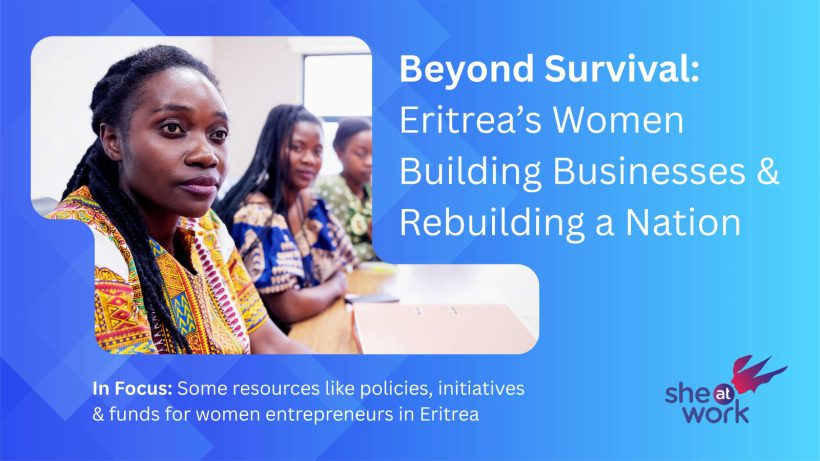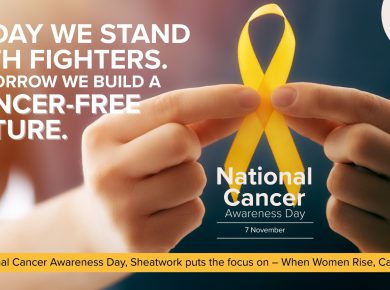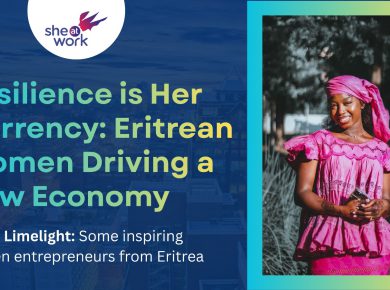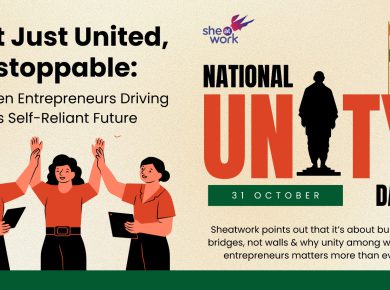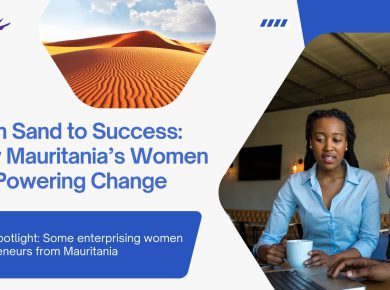In Focus: Some resources like policies, initiatives & funds for women entrepreneurs in Eritrea
#WomenOfEritrea #EntrepreneurialJourney #RebuildAndRise #WomenLeadAfrica #CommunityStrength #RedSeaRegion
Eritrea, a nation along the Red Sea with a rich cultural heritage and resilient history, continues to carve its path toward socio-economic stability following decades of conflict. The country had a historical nickname – Medri Bahri, meaning “Land of the Sea” which was used by local people before the Italian colony’s formation.
While much of the population remains engaged in rural, subsistence agriculture, women have long been central to Eritrean society’s strength & progress. From their active participation in the independence movement to their vital role today across farms, markets & micro-enterprises, Eritrean women embody determination and enterprise. What is relevant is that their businesses – often rooted in trade, food services, crafts, and agri-business – sustain households, uplift communities, and help drive the informal economy, particularly in regions where formal employment opportunities are limited.
Eritrea’s Women Entrepreneurs: Quiet Strength, Bold Progress
Yet despite their entrepreneurial spirit, women in Eritrea continue to face constraints like – limited access to formal credit, business training & policy-level support structures. To bridge these gaps and foster inclusive development, several national frameworks and institutional initiatives play an increasingly important role. Programmes led by associations such as the National Union of Eritrean Women (NUEW), community-based savings networks like Ukub, microfinance institutions, and government-supported vocational and enterprise training centers are helping women gain financial skills, start small ventures, and scale their livelihoods. Additionally, Eritrea’s focus on social equality and grassroots mobilization provides a foundation for women to participate in economic decision-making, acquire resources & strengthen collective entrepreneurship.
As Eritrean women continue to transform traditional roles into economic power, expanding supportive schemes, capacity-building initiatives, and policy enhancements will be pivotal to unlocking their full entrepreneurial potential and shaping a more inclusive future.
Let us now focus on some resources that are available for women entrepreneurs in Eritrea like – schemes, initiatives and funding.
- Policies for Women Entrepreneurs In Eritrea
Policies for women entrepreneurs in Eritrea is different. It includes government initiatives and support from organizations like the National Union of Eritrean Women (NUEW), which provide access to microfinance, skills training & market opportunities. Legal frameworks, such as the Transitional Civil Code and the Constitution, support equal rights in business, though some policies for credit, public procurement, and gender quotas are not yet fully detailed.
Legal and constitutional support
The Eritrean Constitution guarantees women’s rights and prohibits gender-based discrimination.
Zeroing in on Right to entrepreneurship, the Transitional Civil Code of Eritrea allows women to undertake entrepreneurial activities on the same terms as men.
Government and organizational programmes
As far as Microfinance goes, the government and organizations like the Savings and Micro Credit Program (SMCP) provide microfinance to women entrepreneurs.
The National Union of Eritrean Women (NUEW) runs capacity-building programmes, including training and awareness campaigns, to help women entrepreneurs develop skills and access resources.
Policies are in place to improve women’s access to employment and skills-training services in both public and private sectors. The government has policies for the social protection of women, including direct support and social security measures.
NUEW conducts awareness programmes to help women understand and protect their rights, including those related to accessing land and property.
- UNDP Eritrea Gender Equality Strategy 2022-2025
Many rules and regulations that enhance women’s rights have been introduced by the Ministry of Justice, among which is the Transitional Code of Eritrea (TCE).
The global UNDP Gender Equality Strategy launched in 2022 – aims to target the power structures and systems that perpetuate discrimination both outside and within the organization.
Using the six Signature Solutions, the strategic direction is moving towards a more unified portfolio approach and systems thinking in advancing gender equality. UNDP’s Six Signature Solutions are at the core of the Gender Equality Strategy. Targeting areas of poverty and inequality, governance, resilience, environment, energy, and gender equality, the strategy aims to holistically answer challenges in working towards more equal and just societies.
Three enablers outlined in the Strategy to achieve it are – finance, digitalization & innovation. The programme priorities of UNDP Eritrea are aligned with the strategy and the Signature Solutions, especially those related to governance, energy, and environment. The Solution on gender equality outlines more specific efforts to target causes and effects of gender equality, such as reversing backlash against gender equality, changing negative gender norms, and preventing and responding to gender-based violence. It calls for stand-alone interventions specific to gender equality, but it is also intended to be integrated across all the other solutions.
- National Union of Eritrean Women (NUEW)
The National Union of Eritrean Women (NUEW) is the primary institution mandated by the Eritrean government – to empower women politically, socially & economically.
NUEW was initially formed as a mass organization of the Eritrean People’s Liberation Front (EPLF).
Following national independence, it was reconstituted as an autonomous non-governmental organization (NGO).
The Mission is: to ensure women’s equal participation in and benefit from all spheres of national life.
The Key objectives are:
- To ensure gender equality and women’s rights.
- To increase women’s social awareness and knowledge.
- To promote the active participation of Eritrean women in development programs.
- To strengthen the organization itself for greater efficiency and influence.
The income-generating activities include – the fact that NUEW runs programmes that support women in establishing small businesses in sectors such as weaving, sewing, hairdressing, beekeeping, and crop production.
There are Credit schemes too like – the union offers group loans, particularly for women-headed households at the village level, to help them improve their livelihoods.
The NUEW provides training in financial management, business management & marketing to enhance entrepreneurial skills.
For providing networking, the organization helps women network with other entrepreneurs through events like workshops, conferences, and festivals.
The “National Union of Eritrean Women” (NUEW) is an autonomous non-governmental organization established in 1979 to promote the empowerment and equal participation of Eritrean women in all aspects of society. Its mission is to ensure women can confidently stand for their rights and share in the political, economic, social, and cultural spheres of the country.
- Eritrean Women in Agribusiness Association (EWAA)
The EWAA is a key partner for women in the agricultural sector – focusing on improving the productivity of its members. It offers specialized, knowledge-based agribusiness training programs to help women manage their resources and apply advanced farming techniques.
The Eritrean Women in Agribusiness Association (EWAA) is an organization established in 2003 to empower Eritrean women in the agriculture sector. It achieves this by providing capacity-building programs on topics like business management and specific agricultural skills, organizing members into specialized groups (eg dairy, poultry, food processing), and helping them address challenges like marketing. EWAA collaborates with stakeholders such as the Ministry of Agriculture (MoA) and the National Chamber of Commerce to help its members improve productivity and business management.
EWAA provides training in business management, marketing, and various agricultural sub-sectors like dairy, poultry, beekeeping, and food processing.
The association conducts need assessments – to ensure that training programmes are tailored to the specific challenges faced by its members. Members are organized into groups based on their specialization to facilitate peer support and focused training.
A key focus is on – improving the marketing of members’ products, which has been a major challenge for women in Eritrean agriculture.
Programmes include skill transfer and practical exposure to increase productivity and help members manage and grow their businesses.
To join, women must be over 18, engaged in agri-business for at least three years, and registered with the EWAA. Programmes are primarily concentrated in the Maekel and Debub provinces.
Collaboration and partnerships
EWAA works with government bodies like the Ministry of Agriculture and institutions like the Eritrean National Chamber of Commerce.
They have collaborated with organizations like FEMCOM, a COMESA institution that supports women in business, to enhance capacity and market linkages.
The National Union of Eritrean Women (NUEW) also works on women’s economic empowerment and partners on similar initiatives.
https://www.comfwb.org/member/eritrea
- Savings and Micro Credit Programme (SMCP)
A practice that started 26 years ago, Saving and Microcredit Program (SMCP) is changing the lives of a huge number of people in Eritrea.
The Office of the Saving and Microcredit Program was introduced in Eritrea in July 1996 with a view to improving the living standard of clients under its supervision. Under the auspices of the Ministry of National Development, the small financial institution started by giving a loan of 1.3 million Birr to citizens. Mainly people in rural areas and small towns who do not have access to banks, people who cannot put up a collateral, members of the defense forces who have been discharged from the military and those who have completed their national service are the main clients of SMCP.
The SMCP is the largest microfinance programme in Eritrea and is a major source of support for women entrepreneurs.
The main Purpose is – to help fund new businesses and existing microenterprises, primarily for the economically active poor. Objectives include generating income, creating employment, and alleviating poverty.
The programme uses a “village bank” approach, providing group loans to voluntarily organized solidarity groups. This mutual guarantee system helps overcome high collateral requirements that can be a barrier for many women.
The programme supports a wide range of clients – from petty traders to small business owners, with an emphasis on assisting women-headed households who are particularly vulnerable.
The Eritrean SMCP is a microfinance initiative aimed at poverty reduction, with a significant focus on economically empowering women who were particularly affected by conflict.
The programme largely assists women entrepreneurs and female-headed households, though it has also served male clients.
An academic study noted that the Eritrean SMCP has been successful in improving the economic status of many loan recipients.
The programme is a component of the nation’s broader poverty reduction strategy.
Several international organizations work with national institutions to support women entrepreneurs.
- United Nations Development Programme (UNDP)
In collaboration with Eritrea’s Ministry of Labor and Social Welfare, the UNDP has supported vulnerable women in dryland regions with financial assistance and practical business training.
The United Nations Development Programme (UNDP) works with the Eritrean government on sustainable development through programs focused on inclusive and sustainable development, disaster risk management, and strategic governance. Key areas of partnership include promoting food security, environmental conservation, youth employment, renewable energy, and enhancing institutional capacity in the justice sector. This collaboration is guided by a partnership agreement and a Country Programme for 2022-2026, which aligns with Eritrea’s national priorities and the UN’s Sustainable Development Goals (SDGs).
Areas of cooperation
Inclusive and Sustainable Development:
- Environment and natural resource conservation
- Food security and sustainable livelihoods
- Disaster risk management and resilience building
- Renewable energy
Strategic Governance:
- Youth employment and skills development
- Enhancing human and institutional capacity in the justice sector
- Promoting human rights and civic participation
Other initiatives:
UNDP is also involved in reforestation efforts with the government.
Recent projects include improving electricity access for 250,000 people and community-based fishing development to improve livelihoods and biodiversity, as noted in the UNDP Eritrea Annual Report 2024.
Framework for partnership
- The partnership is formalized by a Standard Basic Assistance Agreement signed in 1994.
- A new UNDP Country Programme 2022-2026 was approved in 2021 to guide collaboration on national development priorities, such as eliminating hunger, poverty, and illiteracy, and achieving the SDGs.
- The partnership also operates within the framework of the United Nations Sustainable Development Cooperation Framework (UNSDCF), jointly signed by the UN and the government in January 2022.
- COMESA Federation of Women in Business (COMFWB)
Eritrea is a member of the regional organization. In cooperation with the NUEW, COMFWB promotes entrepreneurship through capacity-building and helps women access new markets via programmes like e-commerce and exhibitions.
The Comesa Federation of Women in Business (COMFWB) is a COMESA institution which was established in July 1993 in Zimbabwe with the endorsement of the Authority which is made up of Heads of States and Governments of the COMESA member states.
COMFWB acts as a forum for the exchange of ideas and experience among women entrepreneurs; an instrument through which the appropriate portion of COMESA Women in Development Programmes are implemented; a forum for network among women entrepreneurs and an instrument for encouraging women to set up or expand existing enterprises.”
- Business Incubator for African Women Entrepreneurs (BIAWE)
BIAWE is a COMFWB project aimed at establishing and upgrading a network of business incubators in the COMESA region with the purpose of addressing some of the challenges faced by women in small and medium scale enterprises.
Specific Objectives
- To increase the number of women entrepreneurs accessing business support services from business incubators
- To increase the women entrepreneurs that access affordable credit to improve and grow their businesses
- To strengthen partnerships between public and private sector and establish a women mentorship initiative
- To help women MSMEs find market access nationally and through regional facilities of trade integration
Areas of Focus
The BIAWE project focuses on value added agro-processing, handcrafts, leather products and technology as demand driven and also guided by regional experience & its activities involve:
- Entrepreneurship & technical training
- Product value addition
- Market access & trade
- Financial literacy & access to capital
- Business coaching & mentoring
The entrepreneurs will have the opportunity to select viable business options based on personal interest, regional, national priorities and engage in mentorship and forming cooperatives with other women entrepreneurs.
